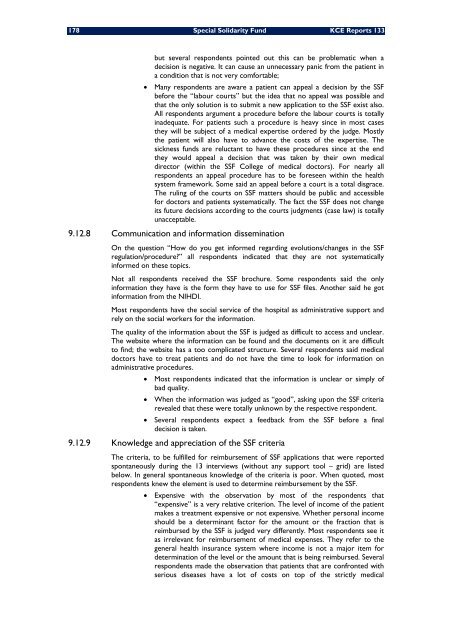Optimalisatie van de werkingsprocessen van het Bijzonder ... - KCE
Optimalisatie van de werkingsprocessen van het Bijzonder ... - KCE
Optimalisatie van de werkingsprocessen van het Bijzonder ... - KCE
You also want an ePaper? Increase the reach of your titles
YUMPU automatically turns print PDFs into web optimized ePapers that Google loves.
178 Special Solidarity Fund <strong>KCE</strong> Reports 133<br />
but several respon<strong>de</strong>nts pointed out this can be problematic when a<br />
<strong>de</strong>cision is negative. It can cause an unnecessary panic from the patient in<br />
a condition that is not very comfortable;<br />
• Many respon<strong>de</strong>nts are aware a patient can appeal a <strong>de</strong>cision by the SSF<br />
before the “labour courts” but the i<strong>de</strong>a that no appeal was possible and<br />
that the only solution is to submit a new application to the SSF exist also.<br />
All respon<strong>de</strong>nts argument a procedure before the labour courts is totally<br />
ina<strong>de</strong>quate. For patients such a procedure is heavy since in most cases<br />
they will be subject of a medical expertise or<strong>de</strong>red by the judge. Mostly<br />
the patient will also have to ad<strong>van</strong>ce the costs of the expertise. The<br />
sickness funds are reluctant to have these procedures since at the end<br />
they would appeal a <strong>de</strong>cision that was taken by their own medical<br />
director (within the SSF College of medical doctors). For nearly all<br />
respon<strong>de</strong>nts an appeal procedure has to be foreseen within the health<br />
system framework. Some said an appeal before a court is a total disgrace.<br />
The ruling of the courts on SSF matters should be public and accessible<br />
for doctors and patients systematically. The fact the SSF does not change<br />
its future <strong>de</strong>cisions according to the courts judgments (case law) is totally<br />
unacceptable.<br />
9.12.8 Communication and information dissemination<br />
On the question “How do you get informed regarding evolutions/changes in the SSF<br />
regulation/procedure?” all respon<strong>de</strong>nts indicated that they are not systematically<br />
informed on these topics.<br />
Not all respon<strong>de</strong>nts received the SSF brochure. Some respon<strong>de</strong>nts said the only<br />
information they have is the form they have to use for SSF files. Another said he got<br />
information from the NIHDI.<br />
Most respon<strong>de</strong>nts have the social service of the hospital as administrative support and<br />
rely on the social workers for the information.<br />
The quality of the information about the SSF is judged as difficult to access and unclear.<br />
The website where the information can be found and the documents on it are difficult<br />
to find; the website has a too complicated structure. Several respon<strong>de</strong>nts said medical<br />
doctors have to treat patients and do not have the time to look for information on<br />
administrative procedures.<br />
• Most respon<strong>de</strong>nts indicated that the information is unclear or simply of<br />
bad quality.<br />
• When the information was judged as “good”, asking upon the SSF criteria<br />
revealed that these were totally unknown by the respective respon<strong>de</strong>nt.<br />
• Several respon<strong>de</strong>nts expect a feedback from the SSF before a final<br />
<strong>de</strong>cision is taken.<br />
9.12.9 Knowledge and appreciation of the SSF criteria<br />
The criteria, to be fulfilled for reimbursement of SSF applications that were reported<br />
spontaneously during the 13 interviews (without any support tool – grid) are listed<br />
below. In general spontaneous knowledge of the criteria is poor. When quoted, most<br />
respon<strong>de</strong>nts knew the element is used to <strong>de</strong>termine reimbursement by the SSF.<br />
• Expensive with the observation by most of the respon<strong>de</strong>nts that<br />
“expensive” is a very relative criterion. The level of income of the patient<br />
makes a treatment expensive or not expensive. W<strong>het</strong>her personal income<br />
should be a <strong>de</strong>terminant factor for the amount or the fraction that is<br />
reimbursed by the SSF is judged very differently. Most respon<strong>de</strong>nts see it<br />
as irrele<strong>van</strong>t for reimbursement of medical expenses. They refer to the<br />
general health insurance system where income is not a major item for<br />
<strong>de</strong>termination of the level or the amount that is being reimbursed. Several<br />
respon<strong>de</strong>nts ma<strong>de</strong> the observation that patients that are confronted with<br />
serious diseases have a lot of costs on top of the strictly medical

















